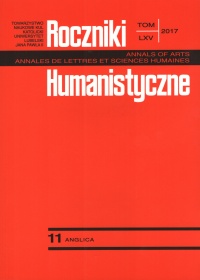Context-Related Semantics: Evaluation of Expressive Quality of Lexical Items
Abstract
The aim of this paper is to point out and analyse the closest environment of lexemes that are intended to have expressive qualities within the given contexts. The analysis focuses on words, whose primary meanings are not characterised by expressiveness, and, if found in a different (neutral) context, they would not necessarily be perceived as subjective, emotionally loaded expressions. The material analysed in this paper consists of selected volumes of the popular series of J. K. Rowling's Harry Potter books. The introductory part of the paper is theory-based: it clarifies the reasons for such choice of the material; it also explains why the semantic and stylistic character of a larger context is significant in understanding the connotation of a particular word within this context. The analytical part is divided into three sections, focused on three major types of contextual indicators of expressiveness, which were distinguished in the analysed material.
References
Braun, Sabine. 2007. “Audio description from a discourse perspective: A socially relevant framework for research and training.” Linguistica Antverpiensia, NS (6), pp. 357–72.
Bryson, Bill. 1991. Mother tongue: The English language. New York: Penguin Books.
Closs Traugott, Elizabeth, & Richard B. Dasher. 2004. Regularity in semantic change. Cambridge: Cambridge University Press.
Fonagy, Ivan. 2001. Languages within language: An evolutive approach. Amsterdam: John Benjamins Publishing Company.
Fortin, Antonio. 2011. The Morphology and Semantics of Expressive Affixes. Unpublished PhD diss., Lady Margaret Hall University of Oxford, Oxford.
Gumperz, John J., & Stephen C. Levinson. 1996. Introduction to part I. In John J. Gumperz & Stephen C. Levinson (eds.), Rethinking linguistic relativity. Cambridge: Cambridge University Press, pp. 21–36.
Klein, Ewan. 1980. “A semantics for positive and comparative adjectives.” Linguistics and Philosophy 4 (1), pp. 1–45.
Lucy, John A. 2010. Language structure, lexical meaning, and cognition: Whorf and Vygotsky revisited. In Barbara Malt & Phillip Wolff (eds.), Words and the mind: How words capture human experience. Oxford: Oxford University Press, pp. 266–86.
Narrog, Heiko. 2012. Modality, subjectivity, and semantic change: A cross-linguistic perspective. New York: Oxford University Press.
Quirk, Randolph, Sidney Greenbaum, Geoffrey Leech, & Jan Svartvik. 1992. A grammar of contemporary English. Singapore: Longman Singapore Publishers Pte Ltd.
Rowling, J.K. 1997. Harry Potter and the sorcerer's stone. New York: Arthur A. Levine Books.
Rowling, J.K. 2004. Harry Potter and the order of the phoenix. New York: Arthur A. Levine Books.
Rowling, J. K. 2014. Harry Potter and the half-blood prince. London: Bloomsbury Publishing.
Copyright (c) 2017 Roczniki Humanistyczne

This work is licensed under a Creative Commons Attribution-NonCommercial-NoDerivatives 4.0 International License.





